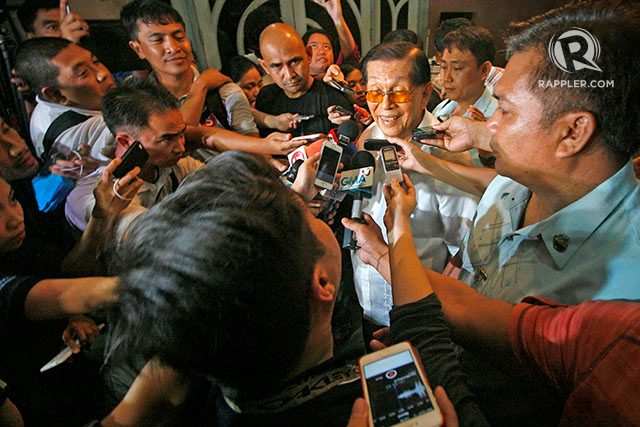SUMMARY
This is AI generated summarization, which may have errors. For context, always refer to the full article.

MANILA, Philippines – The High Court needs to clarify the parameters of the grant of bail to Senator Juan Ponce Enrile, considering that it is “new doctrine” being introduced in criminal law, Deputy Presidential Spokesperson Abigail Valte said Saturday, August 22.
In an interview aired over dzRB Valte said: “The assumption is because it has been issued as doctrine, then others are free to use it in their pleadings, in their cases, and to use it also as part of their pleadings in appealing for their clients and that should apply. Because it’s doctrine, that should apply equally across all demographics, regardless of political or social status. That is the assumption unless the Supreme Court clarifies otherwise.”
This mean that unless the Supreme Court clarifies otherwise, poor and elderly detainees – citing humanitarian reasons – can be granted bail just like Enrile.
The National Union of Peoples’ Lawyers was reported to be out to test the jurisprudence by seeking bail for political detainees, along with those who are poor and old.
The High Tribunal voted 8-4 on August 18 to grant the petition of the 91-year-old Enrile seeking bail. Charged with graft and plunder – a typically non-bailable offense – Enrile, in his petition, cited as mitigating circumstances his advanced age and voluntary surrender. He also said he was not a flight risk and that strong evidence of guilt had not been established to deny him bail.
In the dissent of Associate Justice Marvic Leonen, he said that if the decision applies only to Enrile, then it amounts to “selective justice.” Besides Leonen, the other dissenters were Chief Justice Maria Lourdes Sereno, Senior Associate Justice Antonio Carpio, and Associate Justice Estela Perlas-Bernabe.
Valte, a lawyer herself, pointed out that the SC ruling did not indicate limitations as to application of the new doctrine. In this case, referring to the fixing of Enrile’s P1-million cash bond, “wala pong inilatag na ganoon (no limits were set). So moving forward, it may be good to clarify also the parameters of bail.”
Study the decision
Asked how President Benigno Aquino III reacted to the SC decision, Valte said the President wanted to be clarified about its implications and conditions of granting bail on humanitarian grounds.
At the very least, she said, the President wants to study the text of the decision. “Ang utos ng Pangulo diyan ay aralin ‘yung desisyon at tingnan kung ano ‘yung susunod na hakbang (The order of the President is to study the decision and see what the next steps are).”
The Palace will leave it to the prosecutors to determine what these next steps, including possible legal remedies, are.
Reacting to the SC decision, Justice Secretary Leila de Lima said it gave the impression of a court that was partial to the elite. She also said it could set a dangerous precedent that could be used by others currently detained over non-bailable offenses. This includes former president Gloria Macapagal Arroyo who is suffering from multiple cervical spondylosis and remains detained at the Veterans Memorial Medical Center. She faces a P366-million plunder charge.
Enrile himself faces plunder charges over the alleged illegal diversion of development funds to fake non-governmental organizations supposedly controlled by Janet Lim-Napoles.
Unchartered territory
Valte said it was understandable for De Lima to have “very strong feelings” about the SC decision, “given that she herself has seen the investigation, because DOJ conducted that investigation and she has seen the evidence.”
De Lima had pointed out that the Constitution does not provide for the argument of humanitarian considerations and that Section 7, Rule 114 of the Revised Rules of Court says that those charged with capital offenses will not be allowed to post bail when evidence of guilt is strong. The Supreme Court cannot determine evidence of guilt because it is not a trier of facts, De Lima explained.
Valte said the grant of bail on new grounds is “unchartered territory” that has to be clarified. – Rappler.com
Add a comment
How does this make you feel?
There are no comments yet. Add your comment to start the conversation.